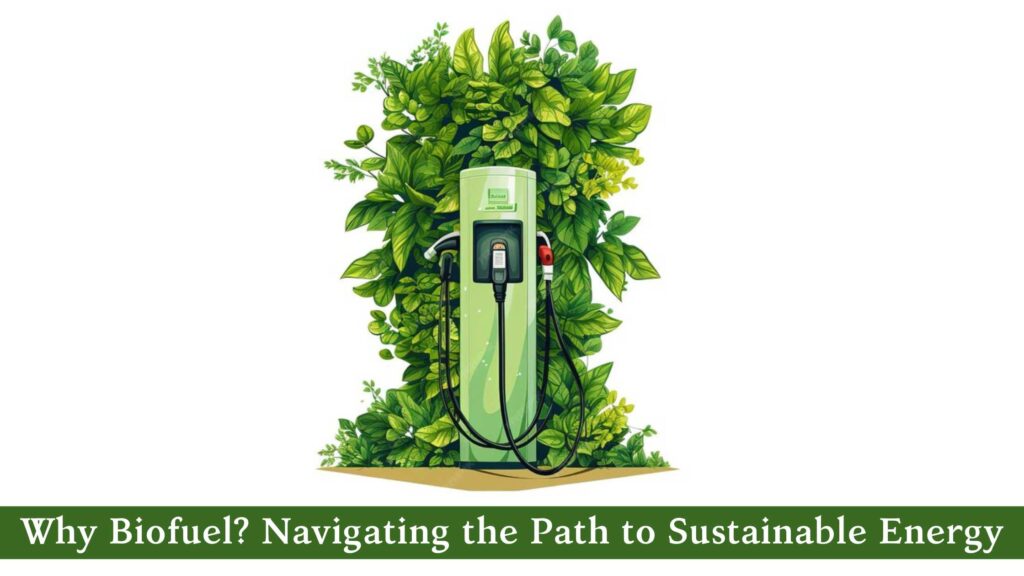Introduction:
In a world grappling with the urgent need for sustainable energy solutions, biofuel emerges as a beacon of hope and innovation. This blog explores the compelling reasons behind the growing interest in biofuels, delving into the environmental, economic, and societal advantages that position biofuels as a key player in the transition toward a more sustainable and eco-friendly energy landscape.
Addressing Climate Change:
At the forefront of the biofuel movement is its potential to mitigate climate change. Fossil fuels have been a major contributor to the increasing levels of greenhouse gases in the atmosphere, leading to global warming and climate disruptions. Biofuels from organic materials like crops, algae, or waste offer a renewable alternative to traditional fossil fuels.
Unlike fossil fuels that release stored carbon into the atmosphere, biofuels recycle carbon dioxide during their growth, creating a closed carbon cycle and helping reduce greenhouse gas emissions. By embracing biofuels, we take a crucial step towards a more sustainable energy future and a healthier planet.
Reducing Dependency on Fossil Fuels:
As finite fossil fuel reserves dwindle and concerns about energy security rise, the need for alternative, sustainable energy sources becomes paramount. Biofuels provide a viable solution by diversifying the energy mix and reducing dependency on conventional oil.
This diversification contributes to energy security, offering a more stable and resilient infrastructure. Being renewable, biofuels provide a continuous energy source, reducing reliance on fossil fuels susceptible to geopolitical tensions and price volatility. This strategic shift towards biofuels benefits individual nations. It contributes to global efforts to create a more sustainable and balanced energy portfolio.
Promoting Rural Development:
The cultivation of crops for biofuel production has the potential to revitalize rural economies. By creating demand for biofuel feedstocks, such as certain crops or biomass, biofuel production can stimulate agricultural activity, generate employment, and bolster the economic prospects of rural communities.
This synergy aligns with the broader goals of sustainable development. Biofuel production often involves collaboration with local farmers, providing them with new markets for their produce and creating economic opportunities in regions that may have struggled with traditional agricultural practices. The resulting economic growth can have a cascading effect, improving living standards and fostering community development.
Enhancing Energy Independence:
Biofuels contribute to national and global efforts to achieve energy independence. Countries can reduce their reliance on imported oil and create a more self-sufficient energy supply chain by producing fuel from locally sourced biomass. This enhances energy security and reduces vulnerability to geopolitical fluctuations in oil markets.
The ability to produce one’s fuel, sourced from local crops or waste materials, contributes to a more resilient and sovereign energy infrastructure. It allows nations greater control over their energy destinies, reducing exposure to the geopolitical complexities often associated with traditional fossil fuel procurement.
Fostering Innovation in Agriculture:
The cultivation of crops for biofuels encourages innovation in agricultural practices. Researchers explore optimizing crop yields, improving land management, and developing more resilient and sustainable crop varieties. This innovation benefits biofuel production and translates into advancements that can improve overall agricultural sustainability.
Sustainable farming practices, such as agroforestry and precision agriculture, are often integrated into biofuel production processes. These practices enhance the efficiency of biofuel feedstock cultivation and contribute to the broader goal of ensuring food security and environmental sustainability.
Generating Green Jobs:
The biofuel industry, from cultivation to processing and distribution, creates a spectrum of green jobs. From farmers growing biofuel feedstocks to scientists researching advanced biofuel technologies, the sector contributes to employment opportunities that align with environmental and social sustainability goals.
The green job market encompasses diverse skills and expertise, from agronomists and biologists to engineers and technicians. This addresses unemployment challenges and fosters a skilled workforce dedicated to advancing sustainable energy solutions. The growth of the biofuel industry has the potential to become a cornerstone of a green economy, creating meaningful employment opportunities in a rapidly evolving sector.
Contributing to Circular Economy:
Biofuels align with the principles of a circular economy by utilizing organic waste and residues as feedstock. This helps repurpose materials that would otherwise contribute to pollution or landfill waste. By incorporating biofuels into the energy mix, societies can move towards a more circular and sustainable approach to resource use.
Waste materials, such as agricultural residues and food scraps, can be converted into biofuels, providing a valuable resource rather than contributing to environmental degradation. This circular approach reduces the ecological impact of waste. It contributes to the efficient utilization of resources in the pursuit of sustainable energy.
Conclusion:
The quest for biofuels is not merely a search for an alternative energy source but a journey towards a more sustainable, resilient, and environmentally conscious future. With benefits ranging from mitigating climate change and reducing dependence on fossil fuels to fostering rural development and creating green jobs, biofuels offer a multifaceted solution to the complex challenges of our current energy landscape.
As technology continues to advance and awareness of environmental issues grows, the role of biofuels in shaping a sustainable energy future is destined to become increasingly prominent. The multifaceted advantages of biofuels position them as a key player in the global transition towards a more sustainable and eco-friendly energy landscape. By embracing biofuels, we address current energy challenges and contribute to a future where energy production is harmonized with environmental and societal well-being.


Pingback: The Rise of Biofuels in the Global Energy Landscape
Pingback: Hemp products - plastic, hempcrete, paper and more
Pingback: NAP Limited - The Environmental Impact of Hemp Production